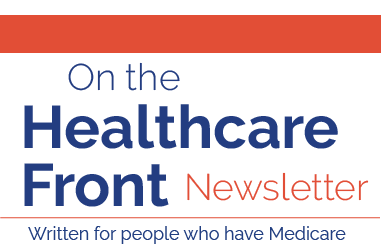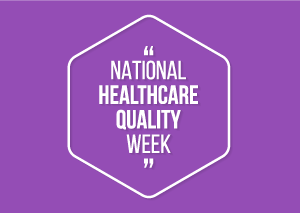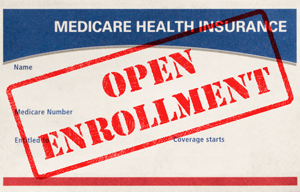
|
Issue #42 October 2025 Newsletter issues will tell you about Acentra Health’s free services for people who have Medicare as well as information from Medicare and other health-related tips. Do you receive email reminders when new issues of On the Healthcare Front are published? |
when should you call acentra health?
- If you are not ready to be discharged from the hospital.
- If your Medicare-covered skilled services are ending too soon. Examples of skilled services include things like physical therapy and nursing services.
- If you have a concern about the quality of care you received.
- If you have a concern about your medical care that needs to be taken care of right away.
Click on the button below for the phone number for your state. These services are free for people who have Medicare.
medicare open enrollment
The Medicare Open Enrollment period is from October 15 to December 7.
Take time to review your coverage. Plans can change each year, and comparing your options can possibly save you money and help you get the care you need.
Learn more on our Medicare Open Enrollment page.

checking the quality of your care matters
October 19 to 25 is National Healthcare Quality Week.
It’s a good reminder that you have the right to know about the quality of the care you receive; specifically, how well a hospital, nursing home, or other facility cares for patients. Quality can mean looking at things like patient safety, staffing, and patient experiences (or satisfaction).
You may want to look up quality ratings if:
- You are choosing a hospital for a planned surgery.
- You are deciding on a nursing home or skilled nursing facility for yourself or a loved one.
- You want to see how your current facility compares to others nearby.
What you can learn:
- Hospitals - Safety record, patient satisfaction, and how often patients return for care.
- Nursing homes - Staffing levels, results of inspections, and resident care.
- Home health agencies - How well they help people recover and stay independent.
You usually cannot find official “quality ratings” for individual doctors. However, you can:
- Check the quality of the hospital or other facility where the doctor works.
- Ask your doctor directly about their experience and patient outcomes.
- Look at your state’s medical board website to confirm the doctor is licensed and see if there are any disciplinary actions.
Where to find information:
- Medicare’s Care Compare for hospitals, nursing homes, and more.
- Call 1-800-MEDICARE (1-800-633-4227) to get quality information by phone.
- Contact your State Health Insurance Assistance Program (SHIP) for free, local help.
Taking a few minutes to check quality can help you choose the safest and best care for your needs.
in this issue |
don't keep this a secret
Share this newsletter with friends and family who have Medicare. Copy and share this link: www.acentraqio.com/ohf/October2025
the medicare open enrollment period starts on october 15. be ready!

getting to know your medicare rights
This article is part of our monthly series, Getting to Know Your Medicare Rights. We share simple tips to help you understand and use your Medicare benefits with confidence.
Every year, Medicare gives you the chance to review your coverage. From October 15 to December 7, you can check your plan and make any needed changes. This is called Medicare Open Enrollment.
Many people say, “I love my plan and it works great for me. Why would I change it?” That’s a common thought, but it is still worth taking a few minutes to review your coverage each year. The reason is simple: plans can change, even if you don’t.
- A premium is the amount you pay each month to keep your plan. Premiums can go up or down each year.
- A provider network is the group of doctors, hospitals, and other types of healthcare providers that your plan will cover. Networks sometimes change, and your doctor may not always stay in your plan.
- Your prescription drug coverage (also called Medicare Part D) may change. A medicine you take now might not be covered next year, or the cost could increase.
Checking your options during Open Enrollment helps ensure that your plan is still the best fit for your needs and your budget.
What if you do not have internet access?
You do not need the internet to review your choices. Here are some other ways to get help:
- Call Medicare directly at 1-800-MEDICARE (1-800-633-4227). A representative can go over plans with you.
- Contact your State Health Insurance Assistance Program (SHIP) by calling 877-839-2675. SHIP counselors should be able to meet with you by phone or in person. Their help is free.
Take a few minutes now
Even if you decide to keep your current plan, you will have peace of mind knowing it is still the best choice for you. Open Enrollment is your time each year to confirm your coverage and make sure it continues to meet your needs.
For more details and helpful information, visit our Medicare Open Enrollment page.
health literacy, a key to taking charge of your health

October is Health Literacy Month, a reminder that while understanding health information isn’t always easy, it’s one of the most important tools you have to protect your health and your Medicare rights.
Health literacy means being able to find, understand, and use health information to help you make good decisions about your care. Good health literacy gives you confidence when you’re doing things like reading a letter (or other document) from Medicare, talking with your doctor, or comparing health plans.
Here are two everyday examples:
- At the doctor’s office: With good health literacy, you can feel comfortable saying, “I don’t understand what you said. Will you please explain that in another way?” Without it, you might nod politely and then leave feeling unsure of what to do next.
- With Medicare notices: If you get a letter saying a service isn’t covered, health literacy helps you recognize that you can appeal (that means asking Medicare or your health plan to look at the decision again). Without that knowledge, you might miss your chance to get the care or coverage you need.
What to look for online
Many of us turn to the internet for answers, which can be useful if you know how to sort through the information. Regrettably, every website has some bias. Therefore, the key is finding ones that aim to inform, not sell.
Trusted sources often include:
- .gov websites are official government websites (for example, www.Medicare.gov).
- .org websites refer to nonprofit groups that usually provide balanced, educational information.
Red flags to watch for:
- Sites that promise a “miracle cure” or sound too good to be true.
- Pages that push you to buy something before giving real answers.
- Information without clear sources or references.
Take the next step
This Health Literacy Month, try one simple step to strengthen your skills: ask one extra question at your next doctor’s appointment or look up a Medicare topic on a trusted site. Each step builds your confidence and helps you take charge of your care.
|
Want to learn more? Visit our Health Literacy page for tips, tools, and resources to help you feel more confident with your health information. |
Publication No. R146810-204-9/2025. This material was prepared by Acentra Health, a Medicare Quality Improvement Organization under contract with the Centers for Medicare & Medicaid Services (CMS), an agency of the U.S. Department of Health and Human Services. The contents presented do not necessarily reflect CMS policy.




